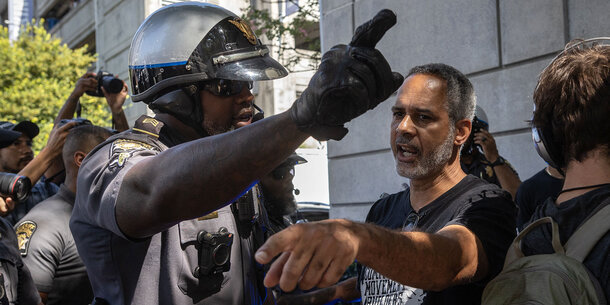Twitter, Reddit, and a trade association representing over 40 major internet companies told a federal court last week that the State Department’s policy requiring visa applicants to register their social media handles violates the First Amendment.
Their friend-of-the-court brief comes in a lawsuit filed by the Brennan Center, Knight First Amendment Institute, and the law firm Simpson Thacher on behalf of Doc Society and the International Documentary Association. The suit argues that the registration requirement gives their members and partners an unacceptable choice: be careful and possibly limit what they share on social media — or be denied entry to the United States, whether to visit or to live. In turn, it deprives American filmmakers of opportunities to hear from their foreign counterparts. And it makes it harder for them to connect the world through film, an important part of their missions.
The Electronic Frontier Foundation and a number of faith-based organizations added their voices in additional briefs about how the registration requirement invades privacy and harms religious minorities.
The brief led by Twitter and Reddit argues that requiring people to register their pseudonymous accounts violates the First Amendment’s protection of anonymous speech. The companies note that the importance of protecting anonymity didn’t start with the internet. Rather, it has “played a central role in American history,” recognized worthy of wielding even by those closest to power. In the lead-up to independence, seminal American documents — such as Thomas Paine’s Common Sense — were written anonymously to avoid retribution from English authorities. Founding Fathers like James Madison and Alexander Hamilton used pseudonyms to debate ratification of the Constitution.
As the companies argue, protecting anonymity is important online, too, given that “many speakers use Internet forums like Reddit and Twitter to make statements that might provoke criticism or retaliation from their communities,” whether for political activism, expressing their sexual orientation, criticizing the practices of organized religious institutions, or to report violence or harassment. Our clients’ members and partners — just like prominent U.S. senators — have used pseudonyms online to protect their identities for these reasons. They include, for example, a person who researches Nazis by joining online discussion groups, a Syrian national who wants to shield against political persecution, and others who “discuss concerns about the Trump administration, as well as … gun laws, abortion rights, and the selection of Supreme Court justices[,]” our complaint notes.
EFF’s brief highlights the fact that whether or not a handle is anonymous, the registration requirement is extremely invasive. It lays out how “social media profiles can paint an alarmingly detailed picture of [visa applicants’] personal lives” and those of their friends, family, and associates. A person’s profile can include relationships, group memberships, political views, photos, videos, locations, and more. The breadth of this information, combined with social media’s interconnected nature, means that profiles “collect[] in one place many distinct types of information … that reveal much more in combination than any isolated record.”
As EFF points out — quoting a concurring opinion by Supreme Court Justice Sonia Sotomayor in case about privacy and technology — the “‘wealth of detail’” revealed “‘about [their] familial, political, professional, religious, and sexual associations’” means a person’s privacy rights are implicated even if this information is openly shared. The Supreme Court has recognized this interest when considering cases involving the government’s warrantless use of a GPS device to comprehensively track a person’s movements.
Finally, a filing by Muslim Advocates, the American Friends Service Committee, T’ruah, and the Reconstructionist Rabbinical Association describes how the registration requirement harms religious activity specifically. Among their points is that the rule’s effects corrode America’s “long tradition of holding interfaith dialogues,” sometimes facilitated by U.S.-based convenings.
Moreover, the faith-based organizations underscore that religious minorities are especially vulnerable to persecution facilitated by the registration requirement. Referencing the administration’s Muslim ban, which the government cited when it initiated the policy, they note that “President Trump has expressed open hostility and an intent to target [Muslims] for special government scrutiny.”
Before implementing the social media registration requirement, the Department of State did not heed the vast majority of over 10,000 public comments containing an array of perspectives opposing it. Now that it has taken effect, many of these concerns have become reality. Indeed, the experiences of our clients and others clearly demonstrate that it stifles the freedoms of expression and association guaranteed by the Bill of Rights.



